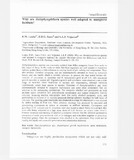Why are Halophytophthora species well adapted to mangrove habitats?
Share
Abstract
Halophytophthora species are commonly isolated from fallen mangrove leaves from early to late stages of decay. In this study we show that these organisms are well adpted to mangrove habitats as they have a wide tolerance to varying levels of pH, salinity and temperature. They also produce, abundant zoospores, and are chemotactically attracted to decaying mangrove leaves, and can readily attach to suitable substrata. In general, the four tested isolates (H. vesicula, H. avicennae, H. kandeliae and H. bahamensis) grew at pH 6-9, with maximum growth recorded at neutral pH. Vegetative growth and sporulation were observed over a wide range of salinities (from freshwater to marine) and temperatures, although optimum requirements varied from species to species. Zoospores of Halophytophthora spp. were chemotactically attracted to mangrove leaf-extracts and some other compounds that are common to the surrounding environment. The zoospores attached and germinated on both artificial (glass coverslips and polycarbonate membranes) and natural (mangrove leaves) substrata. Scanning electron micrographs show that newly attached zoospores, cysts, and germinating cystospores of H. vesicula produced fibrillar adhesive mucilage for attachement as was evident by debris sticking to their tips. More adhesive mucilage was produced by encysted and germinating cystospores on natural as compared to artificial substrata. Cystospores and germlings of H. vesicula and H. avicennae were also found to attach firmly to a perspex disc even after being subjected to a high shear stress of 3.19 Newton per square meter (Nm-2). Enzyme treatment and staining of attached cystospores indicate that the adhesive produced is composed of acidic polysaccharide with α-1, 4 linkages, and with either sulphate or phosphate functional groups. Once the cystospores were attached to the substratum, they could not be readily dislodged, and successful germination and colonization followed.
Suggested Citation
Leaño, E. M., Jones, E. B. G., & Vrijmoed, L. L. P. (2000). Why are Halophytophthora species well adapted to mangrove habitats? Fungal Diversity , 5, 131-151. http://hdl.handle.net/10862/1875
Taxonomic term
Collections
- AQD Journal Articles [1249]

